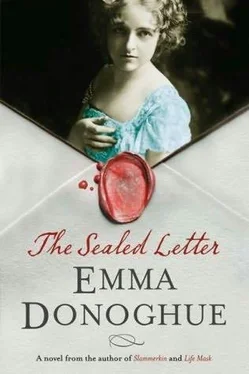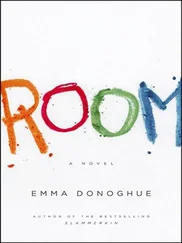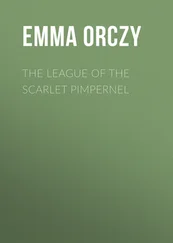"If there should be an explosion, I'll carry you out in a trice," Anderson tells Helen. "Both of you," he corrects himself, "under my arms, like twin battering rams!"
Fido can't stop her eyebrows shooting up.
"Beg pardon, my imagination rather ran away with me there." His whiskers look more like a spaniel's ears than ever.
"You must excuse the colonel," murmurs Helen, laughing in Fido's ear. "We're a dreadfully lax lot on Malta; the sun evaporates all our Anglo proprieties."
But Helen, after childhood in Calcutta and adolescence in Florence, is the most un-English of Englishwomen; she's always waltzed her way around the rules of womanhood. It's a quality that Fido relished even when she was young, long before she ever did any hard thinking about the arbitrariness of those rules.
Helen is staring at a label on the window that bears a picture of a heart, and inside it, in Gothic lettering, The Dead Heart.
"It's a play," Fido tells her.
"Ah." A sigh. "I've been gone so long, I'm quite behind the times."
"The whole city's pockmarked with these irksome labels," Anderson mutters. "Really, advertising has had its day; the public can't be fooled anymore."
"At the theatre, by the by, don't you hate women who're afraid to laugh?" Helen asks Fido.
"Awfully," she says, grinning back at her. It's the surges of familiarity that she's finding strangest: as if the friends haven't been apart for a moment.
A piercing whistle makes Fido jump, and the carriage sways into move ment. All at once her dress feels soaked in the armpits and the small of the back. Her chest's a little tight; she makes herself take long breaths of the metallic air. The wheels start to thunder, the engine screams. The carriage is filling up with vapour, and she coughs violently; Anderson stands and wrestles with the window catch. "Breathe it in deeply," says Helen, one hand caressing Fido's shoulder blade.
The smoke feels poisonous, but then medicines often do; she does her best to fill her lungs and hold it in. The train's been swallowed up by darkness, and the gaslight flares up greenly. At this speed, there's a peculiar vibration, a sort of undulation of the thundering machine. Above them, she knows, there's more than twenty feet of packed London earth. How do the thirdclass passengers bear it in their open wagons? This isn't like a railway tunnel, because it shows no sign of coming to an end.
"More than a little oppressive, no?" she remarks, but the others show no sign of hearing her over the shrieking demons, and she shouldn't have spoken because now she's hacking so hard her lungs are on fire. Between the coughs, the wheezing is getting worse. She fumbles in her bag, claws the lining.
"Let me, let me," shouts Helen, taking the bag from her. "Is this little bottle-"
Fido undoes it with spasmodic fingers and puts it to her nose. The camphor and menthol make her eyes water, and she gasps. She takes a long drink that burns like vitriol. But already she can feel the laudanum calming her lungs a little. She finds a folded handkerchief and douses it in the mixture. Holding it to her face, she makes herself do nothing but breathe.
The train's stopped. Anderson is speaking in her ear, something about King's Cross, can she manage a little longer or should they alight here? She shakes her head, unable to speak. Her wretched lungs!
Another few minutes of jolting and shrieking, and then the train halts again: Euston. Anderson's helping her to her feet, and Helen's holding her other elbow. Up a long, twisting staircase-they all three stop whenever Fido's overtaken by a coughing fit. A male passenger's voice behind mutters a complaint, and Anderson turns to snap something about the lady's being unwell.
Finally they emerge on Gower Street. The sun's gone behind a thick veil of cloud, and it seems a little cooler. Fido's breathing has eased enough to let her speak: "I'm perfectly well now, really."
"All my fault," Helen is lamenting as they turn down Endsleigh Gardens. "My vagaries so often end in disaster…"
"Not at all," says Fido hoarsely; "my own doctor recommended the experiment."
Helen's face brightens. "It is rather a thrill, though, isn't it, to cross the capital in a matter of minutes?"
She nods, coughing explosively again.
At the entrance to Taviton Street, the top-hatted gatekeeper expresses such concern for Miss Faithfull's health that Anderson's obliged to tip him.
"If you please," says Fido, on her steps, loosening herself from her friends' arms, "I'm quite recovered now." Embarrassment makes her voice almost surly. "You've been awfully kind, Colonel."
"Fortunate to be of any assistance to such a celebrated lady," says Anderson with a neat bow.
"Will you solemnly swear to rest now?" breathes Helen in her ear. "And a line tomorrow."
"A paragraph, at the least."
They part laughing; their hot hands come away reluctantly, like ivy. It's all very strange, Fido thinks; seven years of silence cracked open like a windowpane.
She uses her own key; she's never seen the need for interrupting the servants' work to make them let her in.
It's these small, rational reforms that make the Reverend and Mrs. Faithfull shudder so, on their rare visits from Headley. Her father's a clergyman of the old, well-bred, moderate school; he preaches in tailored black, and has equal scorn for genuflecting Tractarians and Low ranters. Fido still feels bad about the enormous expense she put him to by her coming out: all those unflattering flounces, and for what? At twenty-two, finding herself alone in London after the Codringtons' departure, she had a quiet tussle with her parents that ended with her winning their cautious agreement that she was to be treated as a sensible spinster of thirty, with her own modest household, trying to make her way in the literary world. But two years later, when Fido broke it to them that she had taken up the cause of rights for women, and was setting up a printing house as a demonstration of female capacity for skilled labour, Mrs. Faithfull got two red spots very high in her cheeks and asked whether it wasn't generally held that a lady who engaged in trade, even with the highest of motives, lost caste. Fido countered with some sharp remarks about idle femininity that make her wince to remember, especially considering that her mother has never known an idle hour in her life.
What about these days? Do the Faithfulls consider the youngest daughter of their eight to be still a lady? Best not to ask. Officially they condone her life in the capital- your mission, her mother called it once, which must be how she describes it to her neighbours in Surrey-but Fido can sense the strain. They'd so much rather she were settled in some country town and producing a child a year, like her sisters.
Upstairs, in her bedroom, Fido catches sight of herself in the mirror. Intelligent eyes in the long, upholstered face of-well, there's no other way to put it-a well-fed dog. Her limp brown hair, cropped to her neck, is pulled back by a plain band. The flesh sags softly under her chin where white lace, grubby from her morning in the City, meets the brown cloth. No corsets, no crinoline: it cost her only a little pang to give them up, and she never misses them now. (They didn't make her look any prettier, only more conventional, another harmless frilled sheep drifting along with the herd.) Walking arm in arm with Helen this afternoon, it strikes her that the two of them must have looked like characters from quite different sorts of book. Well, Fido's as God made her. And as she's chosen to be. At least the way she dresses now is clear, uncompromising-and not eccentric enough to demand attention. It announces, I have more pressing business than to wonder who's looking at me.
She prises off her shoes before lying down. She hopes she isn't marking the counterpane. A shower-bath would be delicious, but the company only turns the water on in the mornings. Well, that's the last time she'll let herself be dragged through the vaporous sewers of the Underground. Some days this city is too much for her: a clanging machine that threatens to crush and swallow her. Some days she doubts her lungs will hold out till she's forty. But if she led the kind of quiet provincial days the Reverend and Mrs. Faithfull would prefer for their youngest daughter, it wouldn't be asthma that would choke off her life force in the end, but ennui. The fact is that for all its infinite varieties of filth, London is the thumping heart of everything that interests her, the only place she can imagine living.
Читать дальше












